Key points:
- For Pride Month, Edgehill United Methodist Church held a vow-renewal service for three married gay couples from three generations.
- The couples, all leaders in the Nashville congregation, were previously unable to wed at their church home because of United Methodist bans that were overturned last year.
- The ceremony occurred on Pentecost Sunday. The Rev. Eric Mayle, the church’s pastor, described the day’s festivities as a reminder that God pours out the Holy Spirit on all people.
Laura Smotherman burst into tears when a Tennessee justice of the peace reneged on performing her wedding to Lindsey Dye when he saw two women before him.
Eight years later, Dye tenderly wiped away Smotherman’s tears as the couple renewed their wedding vows surrounded by their community at Edgehill United Methodist Church.
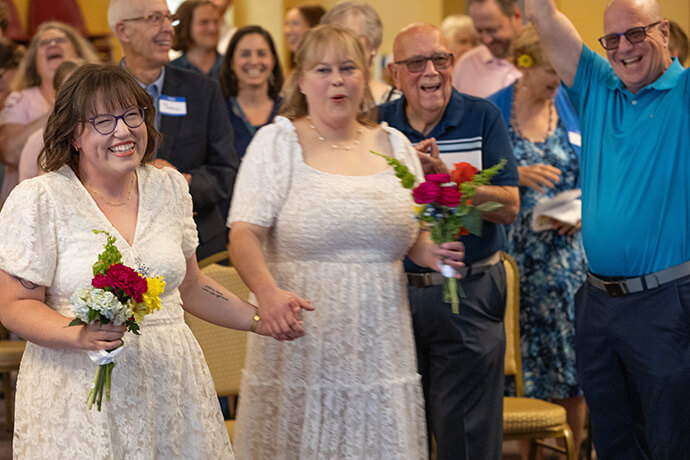
The two were among three married couples — all leaders in the congregation — who on June 8 finally could solemnize their marriage covenant with their pastor and within their church home.
The congregation’s vow-renewal service marked not only Pride Month but also the year since The United Methodist Church ended its longtime denomination-wide ban against same-sex weddings.
“Today is not just about Laura and me — although it is about that. We’re really happy to share this day,” Dye, Edgehill’s lay leader, told the congregation during morning worship.
“But the other two couples are from two distinct generations before us, and I feel that they really paved the way for the rights that Laura and I hold today. So it works out to be even more meaningful that today we celebrate with two couples that are our chosen family and our community.”
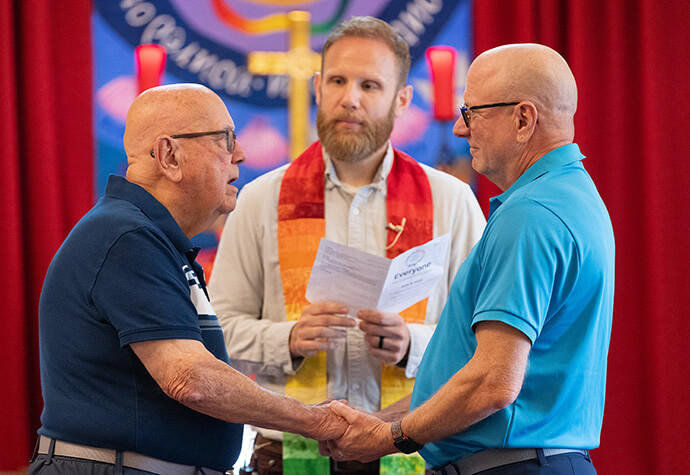
After worship, congregants made room for visiting family and friends to join them as each couple glided down the aisle.
Starting the procession were the Rev. Deen Thompson and John Brown, members of the silent and baby boomer generations who have been together for 35 years.
They were followed by Jay Collins and his husband, both Generation Xers who have been together for 28 years. In an indication of the discrimination LGBTQ people still can face, Collins’ husband is unnamed to protect his employment.
Smotherman and Dye, both millennials, processed last into the ceremony each wearing a wedding dress and carrying bouquets. The two have been together 15 years. They eventually were able to legally wed in 2017 at a tiny chapel in Gatlinburg, Tennessee, but without any loved ones present.
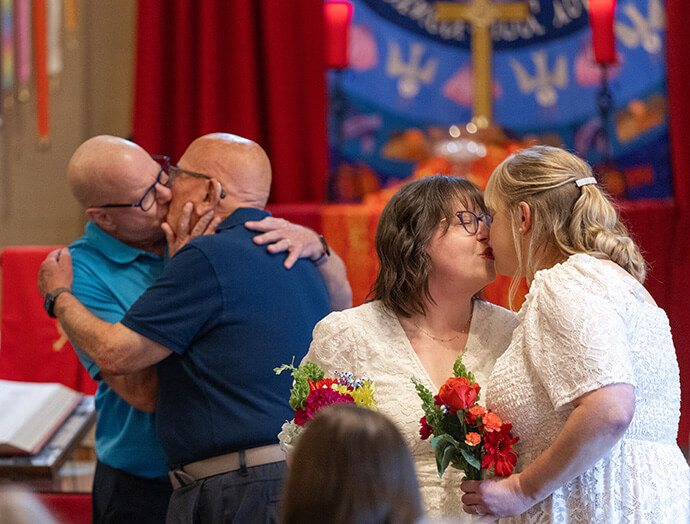
Framed by candles covered with rainbow-colored ribbons, each couple took turns reciting vows that acknowledged their union was not at its beginning but that they still hoped to grow together in love and faith.
“I choose you again, in full knowledge of who you are — the ways you shine, and the ways you’ve grown,” the participants each told their spouses. “I choose you not because we are the same, but because we are beautifully different, and still — miraculously — ours.”
At the end of the vow-renewal ceremony, the community responded in unison: “We give thanks for this love that endures, that bends and blooms across seasons, that roots itself in grace and grows.”
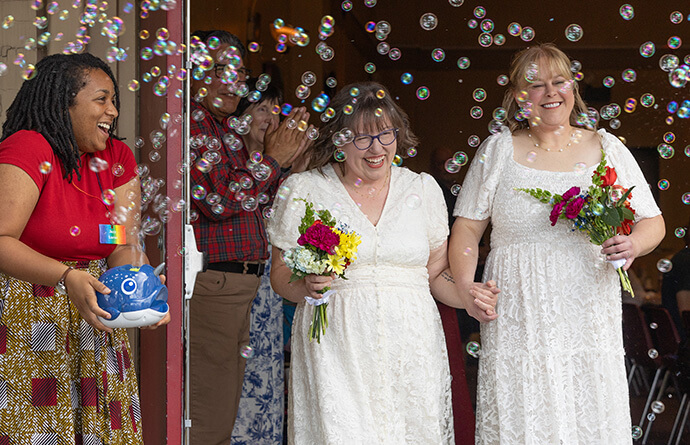
Each couple had their own story to share of overcoming odds and striving for equality in a country and wider church often hostile to them and their love.
They also each had stories of the welcome and support they received at Edgehill United Methodist Church even when, until last year, the broader denomination labeled the practice of homosexuality “incompatible with Christian teaching.”
The multiethnic congregation has made an effort to welcome people of all races and economic backgrounds since its founding in 1966 in a historically Black neighborhood just blocks from Nashville’s Music Row. Dozens of nonprofits in Nashville trace their origins to Edgehill United Methodist Church.
Since the 1970s, the church also has opened its doors wide to the LGBTQ community. Its ministry served as a blueprint for the Reconciling Ministries Network, an association of United Methodist churches that affirm LGBTQ people. The network, whose membership has long included Edgehill, advocated for 40 years for the removal of the denomination’s anti-gay policies before finally achieving success at last year’s General Conference.
The Rev. Eric Mayle, Edgehill’s pastor since July last year, organized the vow-renewal service and wrote the vows.
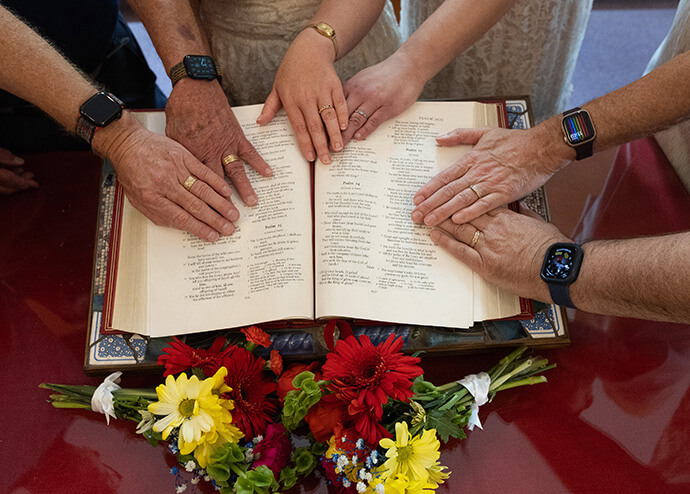
By happenstance, the service ended up coinciding with Pentecost Sunday. Above the heads of those who attended were 50 red, origami “doves” that Collins had days before suspended from the church’s lights to mark the occasion.
During worship, Mayle reminded congregants that the message of Acts 2 is that God pours out the Holy Spirit for all people — including LGBTQ people the church often has rejected.
The vows recited
The couples who participated at Edgehill United Methodist Church’s vow-renewal ceremony took turns coming up to the chancel to recite these words to their spouse.
“I choose you again,
in full knowledge of who you are —
the ways you shine,
and the ways you’ve grown.
I choose you not because we are the same,
but because we are beautifully different,
and still — miraculously — ours.
I promise to keep learning how to love you.
To speak truth and listen well.
To stand with you in joy and in storm.
I promise to hold space for your becoming
and to keep becoming, too.
I chose you then. I choose you still.
I will choose you again —
tomorrow, and every day we are given.”
Learn more about the church at edgehill.org.
“May we stop trying to control the Spirit and start trying to more faithfully follow it,” Mayle preached.
Mayle told United Methodist News that he felt honored to be among the clergy who followed in the footsteps of the Rev. Bill Barnes, Edgehill’s founder and a longtime advocate who died in 2017 before The United Methodist Church moved decisively toward inclusion.
“Edgehill has always stayed on the edge,” Mayle said. “And I’m just a part of the cloud of witnesses that have gone before me, whether it’s Bill Barnes or people in our congregation who today continue to fight for justice and inclusion, so it’s great just to be a little piece of that.”
Thompson and his husband, Brown, are among those who blazed a trail for inclusion. Thompson also has personally experienced the impact of the denomination’s elimination of bans on gay clergy and same-sex marriage.
Thompson, who previously saw his ordained United Methodist ministry end because he is gay, celebrated that the Louisiana Conference reinstated him as an ordained elder last year. Thompson was restarting his life on the staff of the Upper Room in Nashville when he met Brown at a gathering for gay men. The two fell in love.
When he and Brown decided to exchange rings 28 years ago, Thompson reminded his congregation that same-sex marriage was not legally recognized in the U.S., much less the broader United Methodist Church. However, Thompson recalled that when they told the Rev. Bob Coleman, Edgehill’s pastor at the time, about their ring exchange, Coleman made the moment sacred. At the end of the service that day, the pastor proclaimed: “We not only bless your rings; we bless your life.”
Still, Brown told United Methodist News that the June 8 service was all the more meaningful given what had come before.
“From where we came and where we are now — it’s just like we’ve come full circle, and I’m just so grateful to be here,” he said.
Collins, who grew up in The United Methodist Church, shared his excitement that The United Methodist Church as a whole is changing. Congregations like Edgehill no longer risk violating church law while carrying out ministry.
“After so many years, you think this is never going to happen. And then it does,” he said. “It just almost doesn’t seem real. And Edgehill has been so inclusive the whole time.”
Dye and Smotherman had just started attending Edgehill in early 2017 as they also were preparing to come out to their families.
Subscribe to our
e-newsletter
However, that spring, the couple was rocked when Smotherman got very sick with what doctors initially thought might be cancer. That sped up their timeline to get married so Smotherman could be on Dye’s health insurance. It was that decision that led the two to first seek out a justice of the peace.
The two women celebrated on June 8 that their families, for the most part, accepted their relationship. In fact, both brides had family members among those celebrating their vow renewal. Further testing also revealed Smotherman to be cancer free.
“We love each other so much,” Smotherman said. “To be able to have this vow renewal in front of our family and friends is an experience that we always wanted to share but never could until now.”
The day’s festivities ended with a reception that included a wedding cake — with each of the three layers a different flavor selected by each couple. Smotherman and Dye had chosen cookies and cream; Thompson and Brown had caramel; and Collins and his husband opted for “Orange Dreamsicle.”
Woodley McEachern, an Edgehill member since 1968, took delight in joining in the long-sought celebration.
“It’s really wonderful to be able to celebrate the fact that this church has reached the place where we can wholeheartedly celebrate the covenant these couples have.”
Hahn is assistant news editor for UM News. Contact her at (615) 742-5470 or newsdesk@umnews.org. To read more United Methodist news, subscribe to the free UM News Digest.




